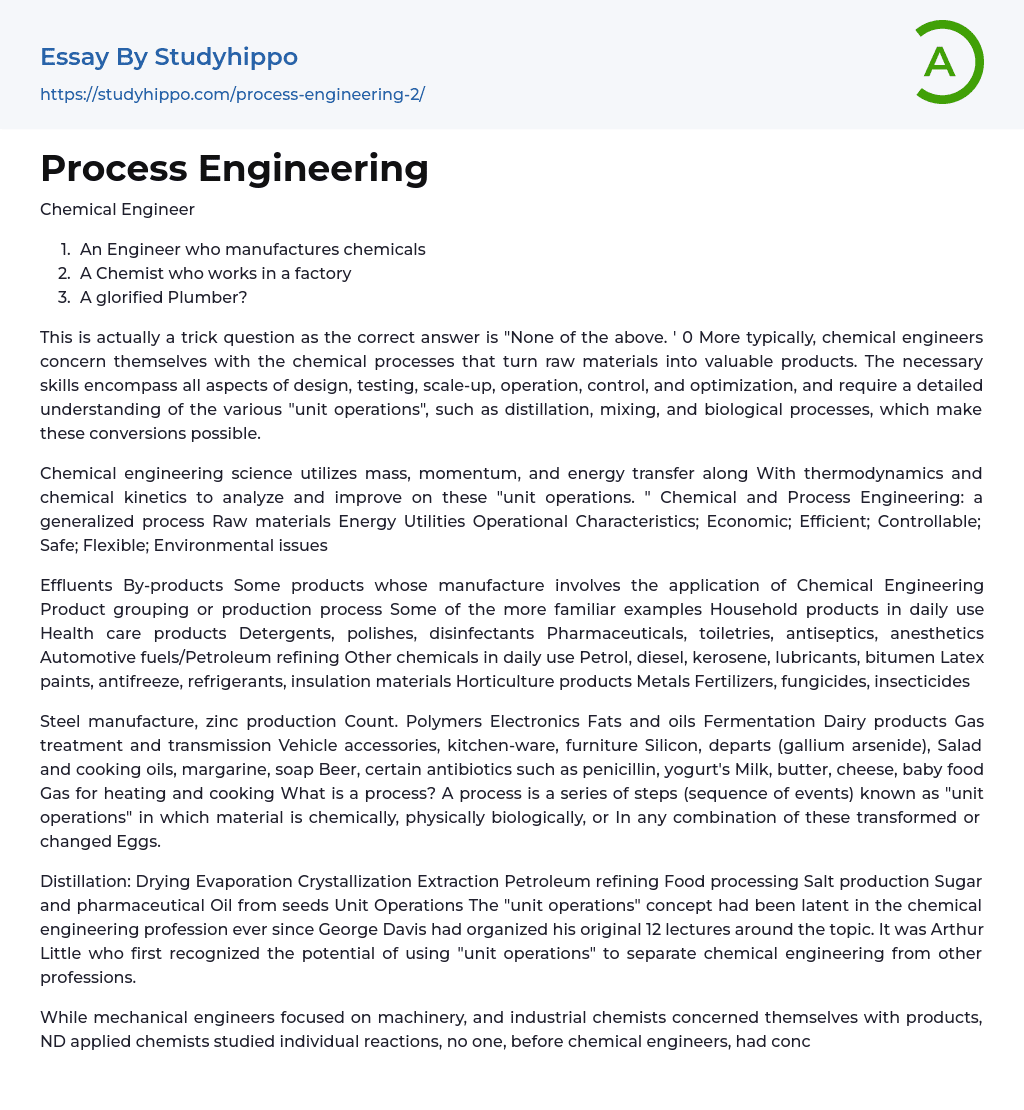Chemical Engineer
- An Engineer who manufactures chemicals
- A Chemist who works in a factory
- A glorified Plumber?
This is actually a trick question as the correct answer is "None of the above." More typically, chemical engineers concern themselves with the chemical processes that turn raw materials into valuable products. The necessary skills encompass all aspects of design, testing, scale-up, operation, control, and optimization, and require a detailed understanding of the various "unit operations", such as distillation, mixing, and biological processes, which make these conversions possible.
Chemical engineering science encompasses the analysis and improvement of "unit operations," which involve mass, momentum, and energy transfer, as well
...as thermodynamics and chemical kinetics. These operations are part of chemical and process engineering, covering all aspects from raw materials to energy utilities. The operational characteristics of these processes include economic viability, efficiency, controllability, safety, flexibility, and consideration of environmental issues such as effluents and by-products.
Chemical engineering is utilized in the production of various products. Examples include household items like detergents, polishes, disinfectants; healthcare products such as pharmaceuticals, toiletries, antiseptics; automotive fuels and petroleum refining; chemicals like petrol, diesel, kerosene; lubricants; bitumen; latex paints; antifreeze; refrigerants; insulation materials; horticulture products like fertilizers fungicides insecticides.
Additionally it extends to other industries such as steel manufacturing zinc production for metals polymers used
in electronics fats oils for cooking salad dressings fermentation processes dairy products milk butter cheese baby food.Chemical engineering is involved in gas treatment and transmission, where unit operations are used to transform or change materials through chemical, physical, biological means, or any combination of these methods. Each step in the process contributes to the overall outcome and desired product. The concept of "unit operations" has been present in the chemical engineering profession since George Davis organized his original 12 lectures around it. Arthur Little was the first to recognize the potential of using "unit operations" to differentiate chemical engineering from other professions. Examples of unit operations include distillation, drying, evaporation, crystallization, extraction, petroleum refining, food processing, salt production, sugar and pharmaceutical production, and oil extraction from seeds.
Chemical engineers were the first to concentrate on the shared processes of all chemical products, reactions, and machinery. Meanwhile, mechanical engineers focused solely on machinery, industrial chemists centered their attention on products, and applied chemists devoted themselves to individual reactions. The conceptual tool known as unit operations enabled chemical engineers to establish their distinctiveness and value within the chemical manufacturing industry.
In order to produce sulfuric acid using the Lead-Chamber Method, a technique that had been long employed but not well comprehended, various ingredients were required: air, water, sulfur dioxide, nitrate, and a large container. Out of these components, nitrate was often considered the most costly due to its need for replenishment since it was released into the atmosphere as nitric oxide during the final stage of the process.
Due to its significance, sulphuric acid was viewed as a reliable gauge of a nation's industrial prosperity. In the pre-World War I
era, two German patriots invented a technique to produce synthetic ammonia. Shortly after the war commenced, the initial plants employing this "Huber-Busch Process" were built. These individuals had found that ammonia could be produced by combining nitrogen gas and hydrogen gas in a chamber with high pressure.
By adding a catalyst and applying heat to accelerate the process, large amounts of fixed nitrogen can be generated. Another competitive industry, called Alkali & The El Blanch Process, produced soda ash (Nuance) and potash (KICKS) through ancient manufacturing methods. These Alkali compounds were extensively used in various products such as glass, soap, and textiles, and were highly sought after.
- John Locke essays
- 9/11 essays
- A Good Teacher essays
- A Healthy Diet essays
- A Modest Proposal essays
- A&P essays
- Academic Achievement essays
- Achievement essays
- Achieving goals essays
- Admission essays
- Advantages And Disadvantages Of Internet essays
- Alcoholic drinks essays
- Ammonia essays
- Analytical essays
- Ancient Olympic Games essays
- APA essays
- Arabian Peninsula essays
- Argument essays
- Argumentative essays
- Art essays
- Atlantic Ocean essays
- Auto-ethnography essays
- Autobiography essays
- Ballad essays
- Batman essays
- Binge Eating essays
- Black Power Movement essays
- Blogger essays
- Body Mass Index essays
- Book I Want a Wife essays
- Boycott essays
- Breastfeeding essays
- Bulimia Nervosa essays
- Business essays
- Business Process essays
- Canterbury essays
- Carbonate essays
- Catalina de Erauso essays
- Cause and Effect essays
- Cesar Chavez essays
- Character Analysis essays
- Chemical Compound essays
- Chemical Element essays
- Chemical Substance essays
- Cherokee essays
- Cherry essays
- Childhood Obesity essays
- Chlorine essays
- Classification essays
- Cognitive Science essays




